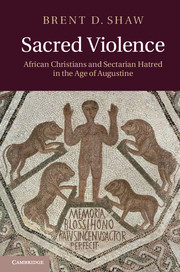Book contents
- Frontmatter
- Contents
- Abbreviations
- Maps
- Acknowledgments
- Introduction
- Chapter 1 This terrible custom
- Chapter 2 Church of the traitors
- Chapter 3 A poisonous brood of vipers
- Chapter 4 Archives of memory
- Chapter 5 The city of denial
- Chapter 6 Ravens feeding on death
- Chapter 7 Little foxes, evil women
- Chapter 8 Guardians of the people
- Chapter 9 In the house of discipline
- Chapter 10 Sing a new song
- Chapter 11 Kings of this world
- Chapter 12 We choose to stand
- Chapter 13 Athletes of death
- Chapter 14 Bad boys
- Chapter 15 Men of blood
- Chapter 16 Divine winds
- Chapter 17 So what?
- Appendix A Bishops and bishoprics in Africa: the numbers
- Appendix B Origins of the division: chronology
- Appendix C The Catholic conference of 348
- Appendix D The Edict of Unity and the Persecution of 347
- Appendix E The mission of Paul and Macarius
- Appendix F Historical fictions: interpreting the circumcellions
- Appendix G The archaeology of suicide
- Appendix H African sermons
- Bibliography
- Index
- References
Chapter 4 - Archives of memory
Published online by Cambridge University Press: 07 September 2011
- Frontmatter
- Contents
- Abbreviations
- Maps
- Acknowledgments
- Introduction
- Chapter 1 This terrible custom
- Chapter 2 Church of the traitors
- Chapter 3 A poisonous brood of vipers
- Chapter 4 Archives of memory
- Chapter 5 The city of denial
- Chapter 6 Ravens feeding on death
- Chapter 7 Little foxes, evil women
- Chapter 8 Guardians of the people
- Chapter 9 In the house of discipline
- Chapter 10 Sing a new song
- Chapter 11 Kings of this world
- Chapter 12 We choose to stand
- Chapter 13 Athletes of death
- Chapter 14 Bad boys
- Chapter 15 Men of blood
- Chapter 16 Divine winds
- Chapter 17 So what?
- Appendix A Bishops and bishoprics in Africa: the numbers
- Appendix B Origins of the division: chronology
- Appendix C The Catholic conference of 348
- Appendix D The Edict of Unity and the Persecution of 347
- Appendix E The mission of Paul and Macarius
- Appendix F Historical fictions: interpreting the circumcellions
- Appendix G The archaeology of suicide
- Appendix H African sermons
- Bibliography
- Index
- References
Summary
…for it is a fact that humans shape their memories to suit their sufferings.
(Thucydides)…as is commonly said by people, memory must be the guardian of lies.
(Optatus)The primal crimes that were the grounds of the division between the two Christian communities – the betrayals during the Great Persecution – remained the lifeblood of sectarian conflict throughout the fourth century. What African Christians at the end of the century knew about this early history of theirs, however, was rather limited. Their evidence was largely confined to the stories and the archival documents that had been assembled between the 340s and the 360s. These writings and the annual replaying of the stories of the martyrs who had died in the onslaught of the Great Persecution formed the basis of their knowledge. Even so, the dissidents shared a special sense of past events that defined their existence. The most explicit short statement of this history was read aloud to the conference at Carthage in 411 by Habetdeum, the bullish dissident bishop of Aurusuliana. After quoting a barrage of biblical texts to prove that bad Christians should be separated from good ones, not just in spirit but also in body, he continued:
This is so much the case that when we bring up to them [i.e. the Catholics] the persecutions and the horrific cruelties with which they and their ancestors have harassed and tortured us and our fathers without ever stopping through a hundred years and more – why, they don't even blush…But who doesn't know that, from the very beginning of their damnable betrayal and in all of their written petitions to the rulers of the age, these traitors and persecutors have begged for our destruction and have attempted to force us into their communion by means of threats and legal charges – all of this against the commands of God? We must speak not just of how much Christian blood was spilled by Leontius, Ursacius, Macarius, Paul, Taurinus, Romanus and the other executioners whom they obtained from the princes of this age for the murder of the saints. There are their other crimes: the great number of venerable bishops killed and others thrown into exile, Christians tortured far and wide, sacred virgins raped, wealthy men proscribed, the poor pillaged, basilicas seized and their bishops forced to flee. There is no one who does not know how many crimes they have committed in our own time. They forced bishops into exile, threw off great heights Christians who were trying to escape their grasp, oppressed congregations, robbed clergy, invaded our basilicas, and rained blows on those who tried to resist them. Finally, at just one village, named Bagaï, they were the cause of the spilling of the blood of many Christians. But not satisfied with this, they have not stopped their terrible acts against us until the present day.
The “hundred years and more” marked out a century of remembered history that had a precise beginning – “their damnable betrayal” – and a long series of events that consisted of the use of the state by the Catholics – “these traitors and our persecutors” – in an attempt to murder the Church of the Truth. And it culminated, in reality and rhetoric, in the slaughter at Bagaï.
- Type
- Chapter
- Information
- Sacred ViolenceAfrican Christians and Sectarian Hatred in the Age of Augustine, pp. 146 - 194Publisher: Cambridge University PressPrint publication year: 2011



